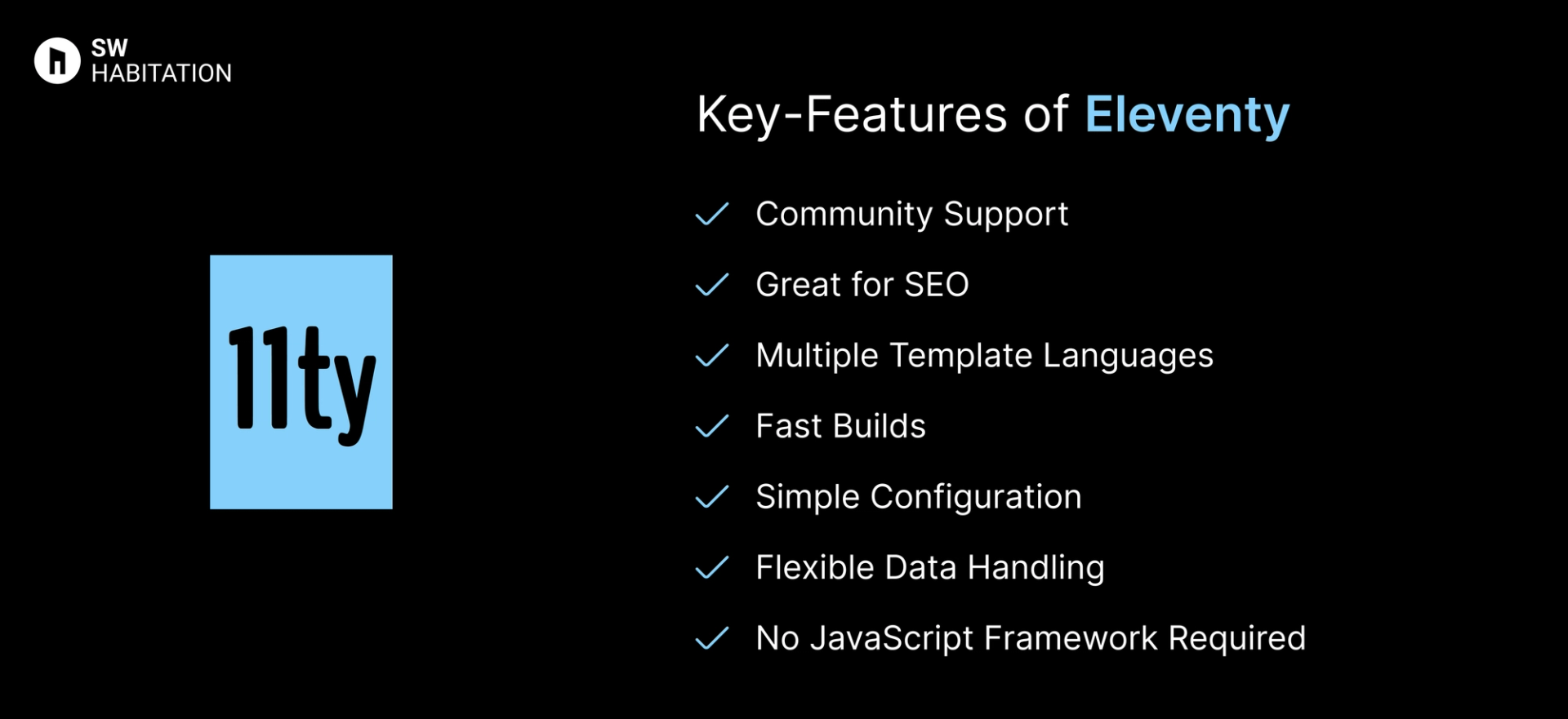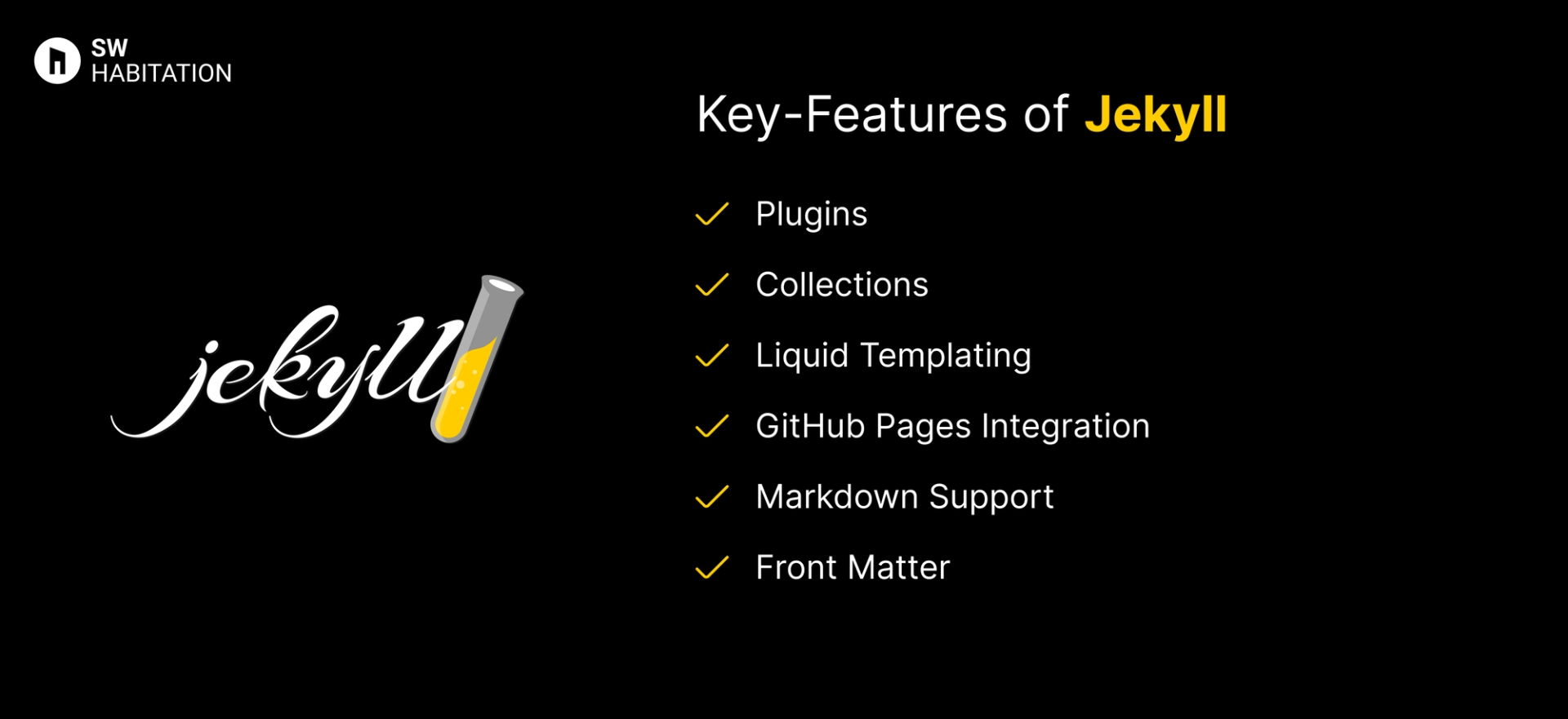Eleventy vs. Jekyll

Eleventy

Jekyll
Have you ever been to a website that loads super fast? Chances are it uses an SSG (Static Site Generator). It’s a tool that builds your site ahead of time, so when someone visits, they get the page instantly. No waiting around for things to load it’s just there.
What is Eleventy ?
Eleventy is a static site generator that takes your content whether it’s Markdown, HTML, or other template languages and compiles it into static HTML files.
Unlike some other SSGs, Eleventy doesn’t lock you into a specific front-end framework, giving you the freedom to structure your project however you like. It’s designed to be simple, flexible, and fast, making it a favorite among web developers who appreciate minimalism.
Key Features of Eleventy


- Community Support: Growing community with tons of plugins and resources.
- Great for SEO: Generates static HTML, making your site search engine-friendly.
- Multiple Template Languages: Supports Markdown, Nunjucks, Liquid, Pug, and more.
- Fast Builds: Optimized for performance with lightning-fast build times.
- Simple Configuration: No complex setup — just a simple .eleventy.js config file.
- Flexible Data Handling: Use front matter, JSON, or JavaScript to handle data.
- No JavaScript Framework Required: Works with plain HTML and CSS if you prefer.
Advantages of Eleventy
- Lightweight: No heavy dependencies or boilerplate code.
- Fast and SEO-Friendly: Static HTML means quick load times and great SEO.
- Simplicity: No need to overthink just build.
- Ideal for Content-Driven Sites: Perfect for blogs, portfolios, and documentation.
- Flexible Content: Use different templating languages in one project.
Disadvantages of Eleventy
- Limited Out-of-the-Box Features: Requires plugins for things like image optimisation or RSS feeds.
- Minimal Abstractions: No built-in state management — you handle everything yourself.
- Learning Curve: Understanding its flexibility takes a bit of time.
What is Jekyll?
Jekyll is an open-source static site generator built with Ruby. It takes your text files (written in Markdown), processes them through templates, and generates a static website that you can deploy anywhere.
No databases, no server-side scripting it just pure HTML, CSS, and JavaScript. It’s super popular among developers, especially for creating personal blogs and documentation sites.
Key Features of Jekyll


- Plugins: Extend functionality with a rich plugin ecosystem.
- Collections: Organize content beyond just posts and pages.
- Liquid Templating: Use Liquid, a simple templating language, to customize your site.
- GitHub Pages Integration: Seamless deployment on GitHub Pages.
- Markdown Support: Write content in Markdown, and Jekyll handles the rest.
- Front Matter: Easily add metadata like titles, tags, and layout options.
Advantages of Jekyll
- Highly Customizable: Tweak layouts, templates, and styles to make the site your own.
- Active Community: Tons of tutorials, plugins, and themes to explore.
- Simplicity: No database, no backend — just Markdown and templates.
- GitHub Pages Friendly: Direct integration with GitHub Pages means free hosting and automatic deployment.
- Perfect for Blogs: Designed with blogging in mind, making it easy to manage posts.
Disadvantages of Jekyll
- Build Times: For very large websites, build times can get a bit slow compared to newer tools.
- Limited Dynamic Content: Since it’s static, things like user authentication or live updates need extra work.
- Requires Ruby: You’ll need Ruby installed on your system, which can be a hurdle for some.
Comparison Between Eleventy vs Jekyll
Use Cases of Eleventy
- Personal Blogs and Portfolios: Simple content-focused sites.
- SEO-Friendly Sites: Static HTML means better indexing by search engines.
- Documentation Sites: Great for organising and presenting technical documentation.
- Minimalist Projects: Ideal when you want full control with minimal abstraction.
Use Cases of Jekyll
- Portfolios: Showcase your work with a simple, fast, and customizable site.
- GitHub Projects: The perfect companion for project documentation hosted on GitHub.
- Documentation Sites: Clean, simple, and easy to organize docs.
- Personal Blogs: Its blogging-focused features make it a favorite for tech blogs.
Other Resources
Conclusion
Static Site Generators are a big game changer if you’re looking to build a website that’s fast, secure, and easy to maintain. Whether you’re launching a personal blog, portfolio, or a business website, they give you the freedom to focus on what really matters, your content and your users without all the extra complexity.
The best part? You’re not locked into one way of doing things. You can choose the tools and tech you’re most comfortable with, and scale things up as your site grows. From lightning-fast load times to better SEO and easy hosting, SSGs make the whole process smoother.
At the end of the day, it comes down to what fits your workflow and goals best. Pick the one that feels right to your requirements, and you’ll be well on your way to creating a beautiful, high-performing website that you’re proud of 🙌
Frequently asked questions
Is Eleventy fast?
Yes very fast, Eleventy is known for its quick build times and low overhead, making it perfect for fast static websites.
Does Eleventy have built-in data handling?
Yes, Eleventy handles data from JSON, YAML, Markdown, and more, which can be injected directly into your templates.
Is Eleventy SEO-friendly?
Yes, Eleventy outputs clean HTML with customizable metadata, so you can fine-tune your SEO strategy easily.
Does Eleventy support multiple templates?
Yes, Eleventy is template agnostic means you can use Nunjucks, Liquid, Markdown, Pug, and more.
Is Jekyll easy to set up?
Yes, Jekyll is developer-friendly and has great documentation. However, it does require Ruby and some command-line usage to set up and deploy.
Can I host Jekyll on GitHub Pages?
Yes, Jekyll integrates seamlessly with GitHub Pages, allowing you to host your site for free directly from your GitHub repository.
Does Jekyll require a database?
No, Jekyll is file-based, meaning your content is stored as Markdown or HTML files. It compiles everything into static files, so there’s no need for a database.
What is Jekyll good for?
Jekyll is perfect for building blogs, documentation sites, portfolios, and personal websites. It’s highly optimized for Markdown and Liquid templating.
